Greater Mossel Bay CPF's Kaskar Race 2025:
30 August 2025, 09:00 AM to 01:00 PM
Race Track: Downhill in Marsh Street, Mossel Bay
Greater Mossel Bay CPF Kaskar Race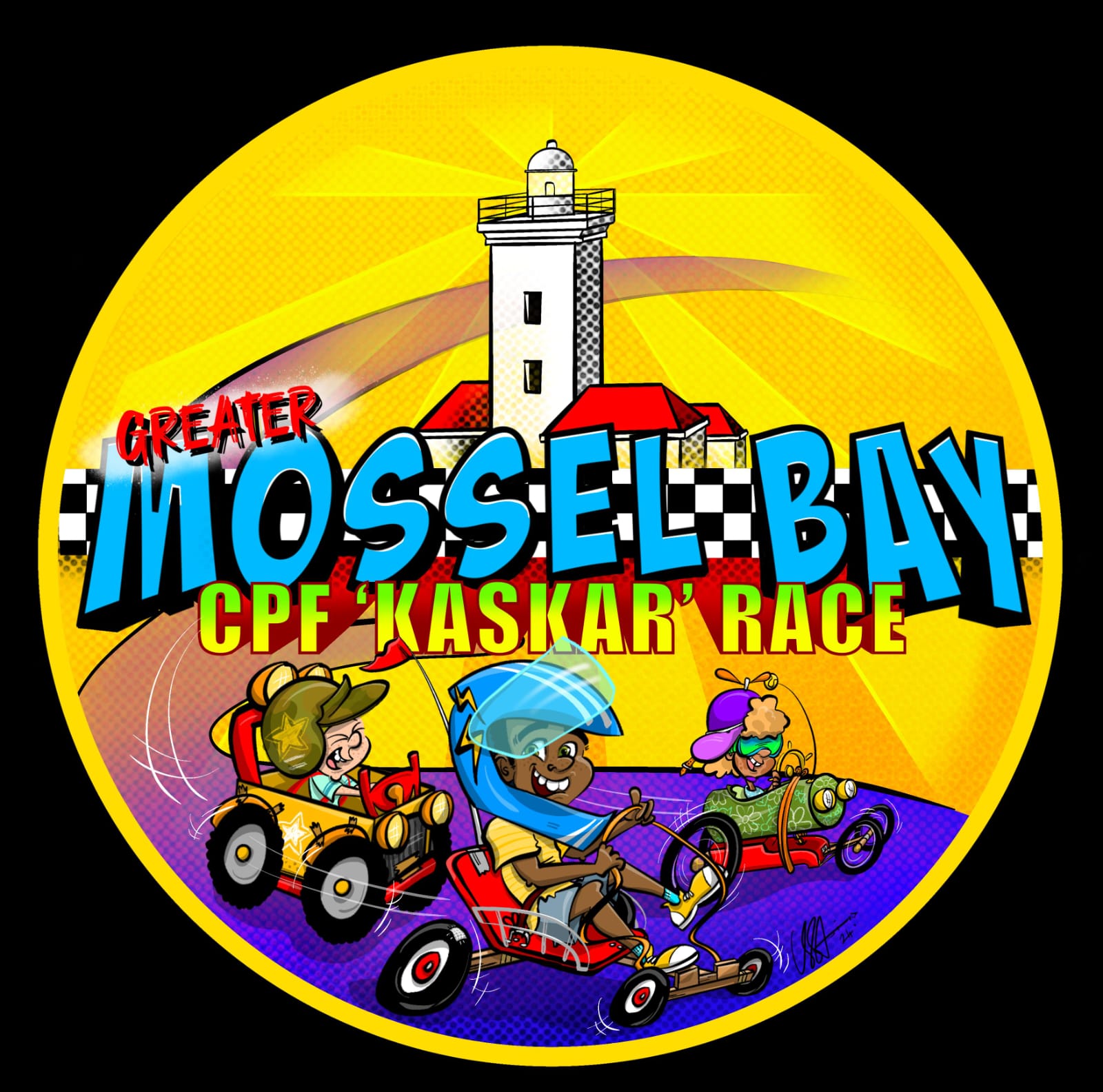
Project Objectives:
To organize a fun, engaging, and safe kaskar race that fosters community spirit, encourages creativity and engineering skills, and raises funds for designated local schools' sports facilities and equipment.
- Community Engagement: Involve local community members in a fun and collaborative event through the collaboration with the following Community Policing Forums:
- Mossel Bay CPF (Chairperson Arthur Riordan)
- Da Gamaskop CPF (Chairperson Philp Mattheus)
- Kwanonqaba CPF (Chairperson Shadrack Shishana)
- Great Brak River CPF (Chairperson Jacky Carstens)
- Team Building: Foster teamwork and creativity among Neighbourhood Watch participants belonging to the four Community Policing Forums.
- Fundraising: Raise funds for designated local schools to assist them with the upgrading of their sport facilities/equipment:
- INDWE Secondary School | Mossel Bay
- Garden Route Primary School | Mosselbaai
- Hillcrest Secondary School | Mossel Bay
- Sao Bras High School | Mossel Bay
- Erika Primary School | Mossel Bay
- Great Brak Primary School | Great Brak River
- Blaize RC Primary School
- Safe Racing Event: Ensure the event is conducted safely and all participants are protected.

- Groups 1 & 2 Kaskarre: The race will start approximately 10 meters past the 6th Avenue intersection into Marsh Street, using all four lanes going downhill.
- Group 3 Kaskarre: The race will start at the Councilor Parking area (at the 200 m mark on the map further below).
The race will end at the intersection of the entrance between erf 4963 and erf 4100 into Marsh Street, with a safety stretch extending to approximately 10 meters before the Marsh Street/Church Street traffic light.
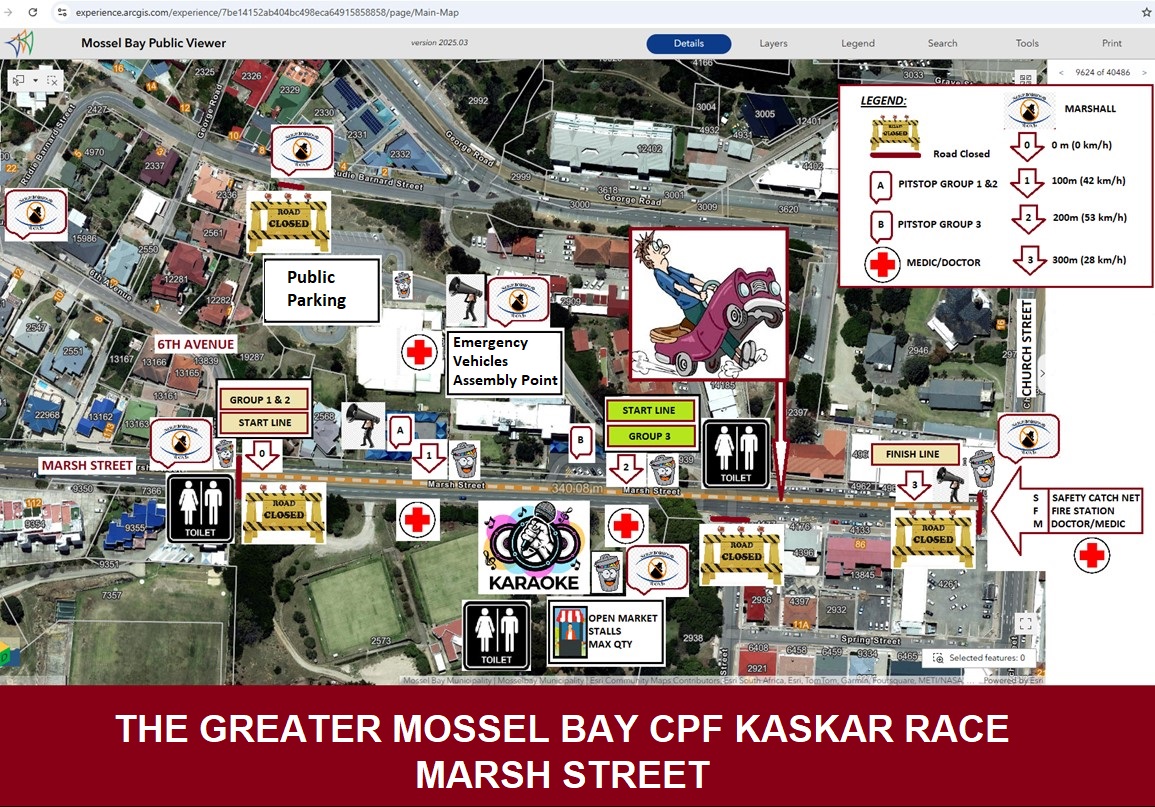

There are three GROUPS of Kaskarre:
| Group | Description | Image | Additional Info |
|---|---|---|---|
| Group 1: Advanced Kaskar Build | Materials: No Limits. | 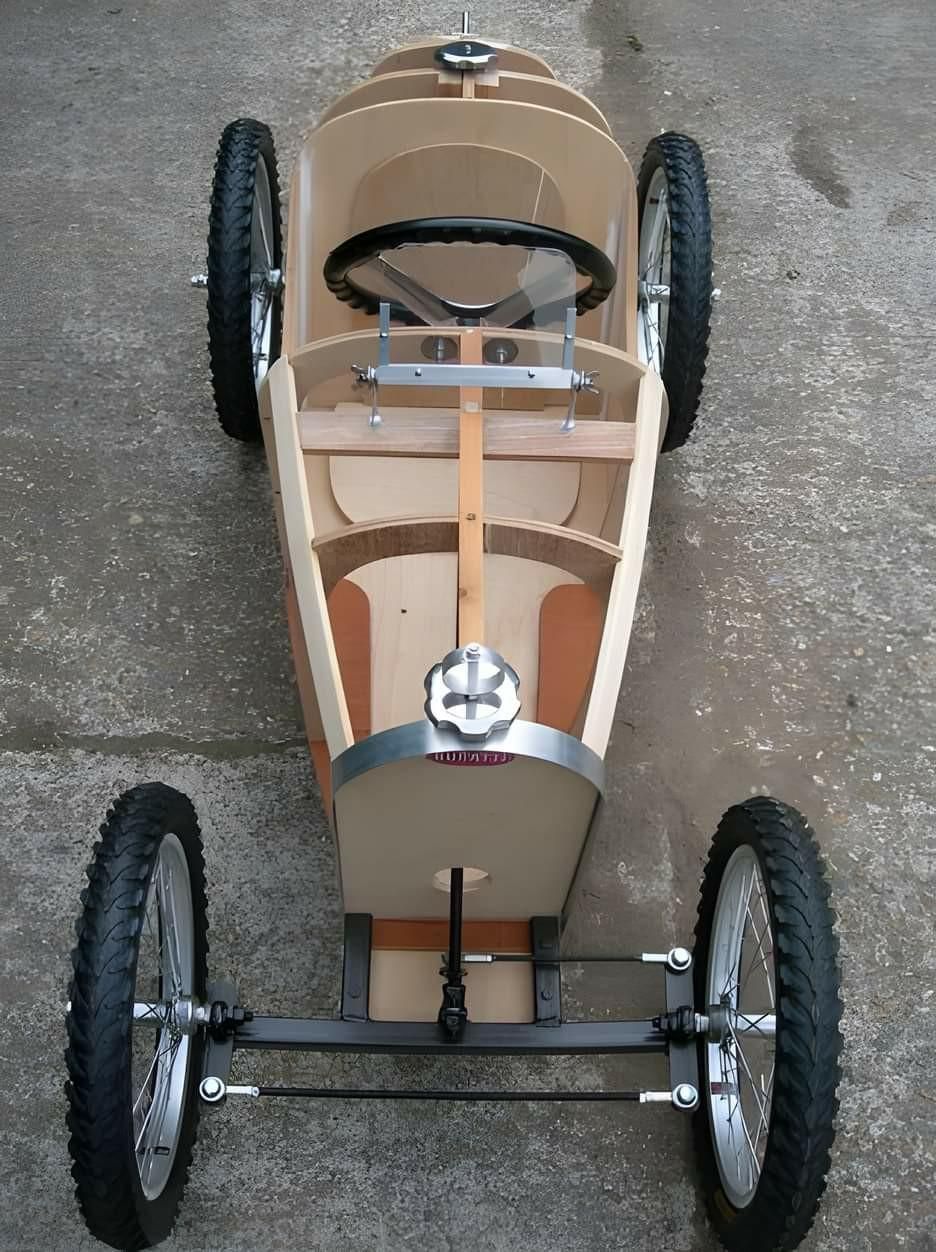 |
Requires advanced skills for construction. |
| Group 2: Intermediate Kaskar Build | Materials: Wood, plastic, and some metal for steering and braking purposes. | 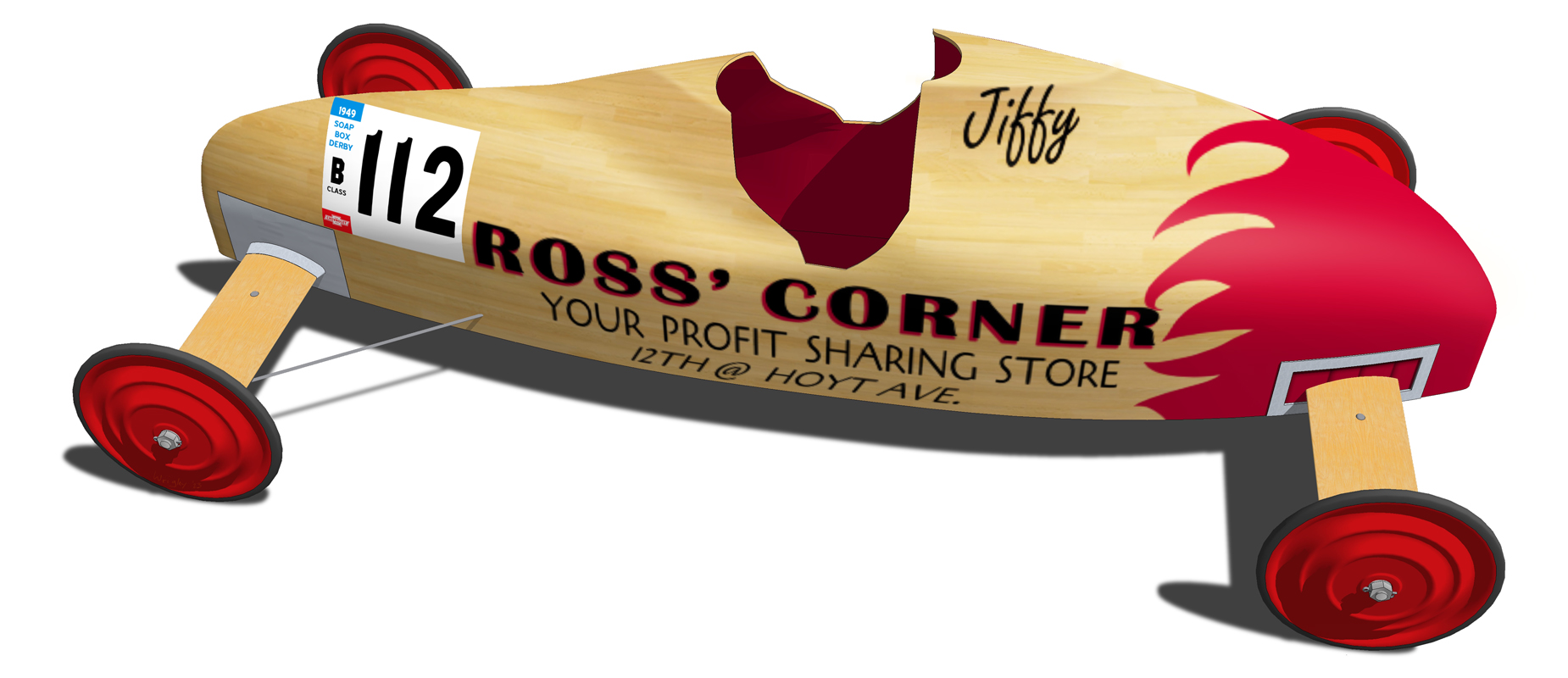 |
Suitable for intermediate builders with some experience. |
| Group 3: Easy Kaskar Build | Materials: Wood. Only axles, braking system, and mounting bolts are allowed to be metal. No nails allowed – use strong wood screws (preferably bolts and nuts) and glue to assemble. | 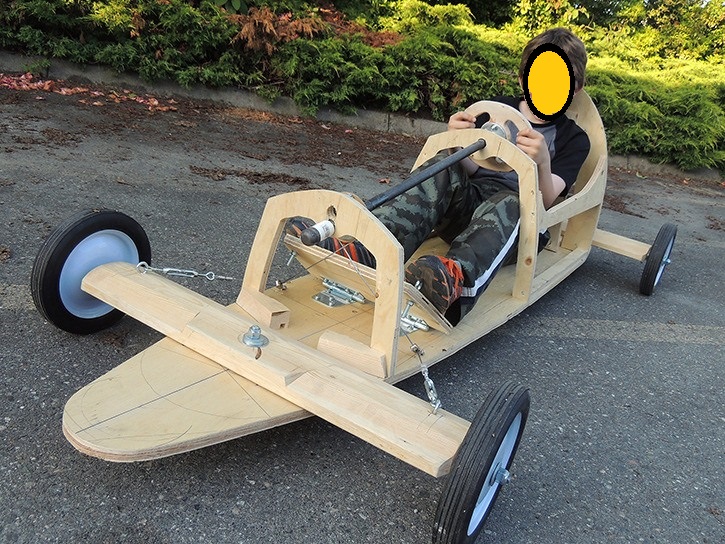 |
Perfect for beginners and simple construction. Visit the store. |
The following regulations apply to ALL kaskarre:
- Must not have any smoke or fire devices fitted.
- Must not have any design elements to endanger themselves or the public (i.e. no sharp metal objects, mirrors or glass).
- No part of the kaskar must extend beyond the width of the kaskar (no dangerous projections).
- The kaskar MUST have a solid floor.
- All kaskarre must have a towing eye front and back or means of attaching a tow rope.
Kaskarre are powered by nothing more than gravity, leg muscles, and adrenaline. Your kaskar can't have an engine or a wind sail to drive it; this race is only based on the force of gravity.
There are three basic requirements for the kaskar and participants:
- DRIVE TRAIN:
- All kaskarre must have 4 wheels (maximum diameter of wheels: 300mm).
- Each kaskar must be gravity powered. No motors or engines or sails. Should not have any mechanical parts to increase its speed (no catapults, pedals, jet or any other engines).
- Kaskarre are generally made of wood. When using wood, it is suggested that you use screws rather than nails and be sure to use plenty of wood glue.
- Kaskarre must not exceed a maximum of 180cm wide and the wheel base from front axle to back axle should not exceed 2.5m.
- Chassis clearance should be no higher than 30cm from the ground and be at least 18cm from the ground.
- It must not exceed 80kg in weight (excluding the driver).
- STEERING: Must have a rigid steering system (no ropes).
- Simple pivot steering is the most basic and common steering system.
- Four bar linkage is like a steering mechanism that you might find in your automobile.
- The car should be able to turn easily without any mechanical restrictions. A system that limits the turning range could hinder the driver’s ability to respond to emergencies.
- The Kaskar race will be run on a straight-line course; however, your car's steering mechanism needs to be able to handle sharp turns.
- Please do not design your kaskar to turn on a dime, it is not safe and may cause your car to flip.
- STOP: Must have a back two-wheel braking system, as a minimum.
- Skid pad on the wheels is an extremely basic, yet amazingly effective braking method. In this method, you set up a pad or brake shoe that rubs against the wheels to stop the car. This is the most preferred method for cars made from scratch because of its effectiveness and simplicity.
- Do not use a skid pad as a ground braking system, as it may damage the road surface on Marsh Street.
- Calliper brakes on the wheels (like your basic bicycle brakes) is a method that works great although the construction needs to be concise for the brakes to be effective.
- Regardless of the braking system that you choose, the most important thing is that the car must be able to stop.
- Good brakes will go a long way in preventing crashes.

Registration Instructions
Please follow these steps to complete your registration for the Greater Mossel Bay CPF Kaskar Race 2025. The registration form is at the bottom of this list of instructions:
- Race Options
- Select your race category (required):
- Group 3: Easy Kaskar Build (R50 per team member)
- Group 2: Intermediate Kaskar Build (R100 per team member)
- Group 1: Advanced Kaskar Build (R200 per team member)
- Check the "Additional Sponsor" box if you want to make an extra donation to support the team (optional)
- Select your race category (required):
- Racer Information
- Provide your full name (required)
- Enter your age (required, must be between 12-99)
- Provide your email address (required)
- Phone number is optional but recommended
- Team & Kaskar Details
- Team name you're part of (required)
- Your team's kaskar name (required)
- Kaskar description is optional but encouraged
- Role in Team
- Check all roles that apply to you (at least one required):
- Team Captain
- Team Driver (exclusive with Team Member roles)
- Team Member 1-4 (exclusive with Driver role)
- Team Sponsor (if you're donating to the team)
- Check all roles that apply to you (at least one required):
- Agreements
- You must agree to both:
- The safety rules and liability waiver
- All race rules and regulations
- Links are provided to review these documents
- You must agree to both:
- Payment
- The form will automatically calculate your total based on:
- Your selected race category
- Any additional sponsor donation (minimum R10)
- The form will automatically calculate your total based on:
- Ticket Information
- Enter your ticket number (required) - this is the number you received when purchasing your ticket through Quicket
- If you haven't purchased a ticket yet, please do so here first
- Submit
- Review all your information
- Click "Submit Registration" to complete your registration
- You'll receive a confirmation email upon successful submission

KASKAR RACE JUDGE SHEET CRITERIA
| Registration Form Serial Number: _______________ |
|---|
|
Captain: Name: ________________________ Surname: _____________________ |
|
Driver: Name: ________________________ Surname: _____________________ |
|
Team Members: 1. Name: __________________ Surname: __________________ 2. Name: __________________ Surname: __________________ 3. Name: __________________ Surname: __________________ 4. Name: __________________ Surname: __________________ |

KASKAR RACE TIME LINE
| Time | Activity | ||||||||||||||||||||||||||||||||||||||||||||||||||||||||||||||||||||||||||||||||||||||||||
|---|---|---|---|---|---|---|---|---|---|---|---|---|---|---|---|---|---|---|---|---|---|---|---|---|---|---|---|---|---|---|---|---|---|---|---|---|---|---|---|---|---|---|---|---|---|---|---|---|---|---|---|---|---|---|---|---|---|---|---|---|---|---|---|---|---|---|---|---|---|---|---|---|---|---|---|---|---|---|---|---|---|---|---|---|---|---|---|---|---|---|---|
| 07:00-09:00 | Setup and Preparation
|
||||||||||||||||||||||||||||||||||||||||||||||||||||||||||||||||||||||||||||||||||||||||||
| 09:00-13:00 | Racing Schedule:
|
||||||||||||||||||||||||||||||||||||||||||||||||||||||||||||||||||||||||||||||||||||||||||
| 12:00 | Judges Finalising results | ||||||||||||||||||||||||||||||||||||||||||||||||||||||||||||||||||||||||||||||||||||||||||
| 12:10 | Awards Ceremony at the Amphitheatre in the Harry Giddy Park | ||||||||||||||||||||||||||||||||||||||||||||||||||||||||||||||||||||||||||||||||||||||||||
| 12:30 | Event Wrap-Up: Thank participants and sponsors. | ||||||||||||||||||||||||||||||||||||||||||||||||||||||||||||||||||||||||||||||||||||||||||
| 13:00 | Event Ends: Clean up and disperse. |
Key Notes
- Number of Races:
- We aim to have 48 kaskarre to enter the race. Each cart races 1 time. The fastest kaskar per group races again in the final race.
- Adjust the number of races if there are more or fewer carts.
- Buffer Time:
- A 5-minute buffer between races accounts for delays in cart dispersal or setup.
- Breaks:
- 10-minute breaks every hour allow participants and organizers to rest and regroup.
- Final Race:
- The fastest kaskar per group races again in the final race.
- Awards Ceremony at the Amphitheatre in the Harry Giddy Park:
- Kaskar Race: Arthur Riordan announce winners and distribute prizes.
- Handover: Mayor Dirk Kotze and Councillor Leon Van Dyk assisted by the Greater Mossel Bay CPF Chairpersons.
- 1st Price Group 1,2, and 3 winning Drivers (4 golden medals)
- 1st Price Group 1,2, and 3 winning Team best team spirit (18 golden medals)
- 2nd Price Group 1,2, and 3 second place Drivers (4 silver medals)
- 2nd Price Group 1,2, and 3 second place Team spirit (18 silver medals)
Note: Each racer receives a bronze medal for participating (48 x 6 = 288 medals).

SAFETY PLAN
1) Pre-Race Preparation:
- Inspect Kaskar: Ensure that all kaskarre participating in the race are structurally sound, with no loose or damaged parts.
- Safety Gear: Require all participants to wear appropriate safety gear, including helmets, knee pads, elbow pads, and closed-toe shoes.
- Ensure that all racers have filled out and signed the indemnity form.
2) Course Inspection:
Thoroughly inspect the racecourse for any hazards or obstacles that could pose a risk to participants. Clear the course of debris and ensure that it is suitable for racing.
3) Participant Briefing:
- Conduct a pre-race briefing for all participants, covering important safety information, race rules, and emergency procedures.
- Emphasize the importance of following instructions from race officials, maintaining control of their kaskarre, and respecting other participants.
4) Supervision and Monitoring:
- Assign trained personnel or volunteers to supervise the race and monitor participants throughout the event.
- Ensure that there is adequate supervision at key points along the racecourse, such as sharp turns or downhill sections.
5) Start and Finish Procedures:
- Establish clear start and finish lines, clearly marked with flags or banners, to indicate the beginning and end of the race.
- Use a countdown or signal to start the race, ensuring that all participants begin at the same time.
- Have personnel stationed at the finish line to record participants' times and ensure a smooth transition at the end of the race.
6) Traffic Risk Assessment:
- Close all lanes of Marsh Street, approximately 5 meters downhill from 1st Avenue, facing the direction of The Point.
- Close all lanes of Marsh Street, approximately 10 meters before the Marsh Street/Church Street traffic light, facing the direction of Da Nova.
- Close all lanes of the Wassung Street intersection to Marsh Street.
- Close the entrance to the Municipality Town Hall at the Rudie Barnard Street intersection.
7) Medical Risk Assessment:
Emergency Preparedness:
- Have a designated first aid station equipped with basic medical supplies and personnel trained in first aid and CPR.
- Establish communication channels for reporting emergencies and coordinating response efforts.
- Develop an evacuation plan in case of severe weather or other emergency situations and ensure that all participants are aware of the procedures to follow.
- Medical Aid kits will be available at each Neighbourhood Watch gazebo.
- First aiders will be posted to assist should any injuries occur.
- Our ambulance services will be asked to be on alert should their assistance be required.
8) Security Risk Assessment:
Neighbourhood Watch Patrol Members will marshal the event.
9) FIRE SAFETY PLAN
Neighbourhood Watch Gazebo's who braai must have the following at their gazebo's:
- Water
- Fire Extinguisher
- Medical Aid Kit
Support from our Fire Department is required to assist with the event when emergencies occur.
10) MARSHALS:
Neighbourhood Watches to have marshals doing point services along the route.
11) POST-RACE DEBRIEFING:
- Conduct a post-race debriefing to review any safety incidents or concerns that arose during the event.
- Gather feedback from participants, volunteers, and spectators to identify areas for improvement and address any safety issues for future races.
12) DOCUMENTATION AND REVIEW:
- Maintain thorough documentation of safety procedures, incident reports, and participant waivers for each race.
- Regularly review and update the safety plan based on feedback, lessons learned, and changes in regulations or best practices.
13) WASTE MANAGEMENT:
- Place mini skips/bins at the starting and finishing points (1 each).
- Each Gazebo must provide its own dustbin. Blue bags are for non-soiled recyclable materials, including plastic, paper, cardboard, glass etc. Black bags are for 'wet' waste, and items that cannot be recycled.
- Each Gazebo must dispose of their black/blue bags in the mini bin closest to them and must leave the stand clean and waste free at the end of the race.
- The mini skip operators must remove their mini skips once everybody has packed up.
14) NOISE EXEMPTION MANAGEMENT PLAN:
- Public Announcing Systems:
- Public announcements to commence different races will be made from the starting point and to narrate the proceedings as they unfold.
- Public announcements will be made from the finishing point to control the dispersal of racers and to manage crowd control.
- Neighbourhood Watches from the Mossel Bay CPF, Da Gamaskop CPF, Kwanonqaba CPF, and Groot Brak CPF will have gazebos in the Harry Giddy Park. We will have disc jockeys and a talent event at the amphitheatre within the Harry Giddy Park, creating a festive atmosphere.
15) TIMELINE AND TIME FRAME 30 AUGUST 2025
To organize the soapbox cart race efficiently, we need to create a timeline that accommodates the following:
- Setup time for each race.
- Race duration for each group of 4 carts.
- Dispersal time for carts after finishing.
- Buffer time for unexpected delays.
Assumptions
- Number of carts: Let's assume there are 48 carts participating (this can be adjusted based on the actual number).
- Race duration: Each race (4 carts) takes approximately 5 minutes to complete the 346-meter track.
- Setup time: 5 minutes to prepare the carts and clear the track between races.
- Dispersal time: 5 minutes to move carts away from the finish line and prepare for the next race.
- Buffer time: 5 minutes between races to account for delays.

Event Organisers:
| Key Roles | Key Responsibilities | Volunteer(s) |
|---|---|---|
| Leadership & Governance | ||
| Event Director | Overall event leadership, stakeholder management, final decision-making, crisis resolution. | Arthur Riordan [email protected] |
| Project Manager | Oversee timelines, budget tracking, team coordination, progress reporting. | Jan Benadè [email protected] |
| Financial Manager | Manages event budget, sponsor payments, ticket sales, expense tracking. | Fiona Williamson [email protected] |
| Legal & Compliance Officer | Ensuring permits, insurance, contracts, safety regulations, and risk assessments are in place. | Philip Mattheus [email protected] |
| Safety & Emergency | ||
| Safety Officer | Conducts safety inspections (racetrack, carts), enforces safety protocols, and overseas emergency drills. | Wilana Boshoff [email protected] |
| Medical Team (EMTs/First Aid) | Sets up first aid stations, responds to injuries, coordinates with hospitals if needed. | Juan Barnard [email protected] |
| Fire Safety Team | Monitors fire risks (especially near crowds/carts), ensure extinguishers are accessible. | Shadrack Shishana [email protected] |
| Police & Security Liaison | Manages crowd control, deters theft/vandalism, handles major incidents. | Lt Col Ashley Michaels [email protected] |
| Traffic & Parking Manager | Plans road closures, parking zones, shuttle services, and pedestrian flow. | Antoinette Snyders [email protected] |
| Race Operations | ||
| Race Director | Enforces race rules, resolves disputes, oversees fair competition. | Hannelie Marais [email protected] |
| Judges Panel | Scores races (speed, design, creativity), announce winners. | Nathan Pillay [email protected] |
| Track Design & Construction Team | Designs/builds the track (ramps, barriers), ensures it meets safety standards. | Volunteer needed |
| Marshals (Track Officials) | Manages race starts/finishes, warns of hazards, communicates with Race Director. | Volunteer needed |
| Timing & Scoring Team | Records lap times, ranks competitors, validates results. | Volunteer needed |
| Technical/IT & AV Team | Manages sound systems, live timing screens, microphones, and announcements. | Volunteer needed |
| Kaskarre Inspectors | Checks cart safety (brakes, structure, weight), approves/rejects entries. | Volunteer needed |
| Logistics & Infrastructure | ||
| Logistics Coordinator | Coordinates equipment transport, storage, and setup/teardown. | Volunteer needed |
| Venue Setup & Breakdown Crew | Erects barriers, stages, signage, and stalls; clears post-event. | Volunteer needed |
| Waste Management Team | Provides bins, recycling, post-event cleanup, and waste disposal. | Volunteer needed |
| Power & Utilities Manager | Ensure generators, electricity for stalls/AV, and lighting. | Volunteer needed |
| Participant Services | ||
| Registration & Ticketing Team | Handles participant check-in, ticket sales, waivers, and wristbands. | Clinton Etheridge [email protected] |
| Hospitality Coordinator | Manages VIP/sponsor lounge, guest seating, and refreshments. | Elmarie Landman [email protected] |
| Vendor & Market Stall Manager | Allocates stall spaces, collects fees, ensures vendor compliance. | Jacky Carstens [email protected] |
| Crowd Control & Ushers | Directs spectator flow, manages seating, and entry/exit points. | Volunteer needed |
| Marketing & Sponsorship | ||
| Sponsorship Manager | Secures sponsors, negotiates deals, ensures sponsor branding visibility. | Volunteer needed |
| PR & Media Liaison | Arranges interviews, press passes and manages photographer access. | Deidre Swanepoel [email protected] |
| Marketing & Advertising Team | Promote the event via social media, posters, press releases, and ads. | Yolande Heyneke [email protected] |
| Event Announcer | Engages crowd with commentary, race updates, and announcements. | Volunteer needed |
| Volunteers & Support | ||
| Volunteer Coordinator | Recruits, trains, schedules, and supervises volunteers. | Ian Retief [email protected] |
| Food & Beverage Coordinator | Oversees food vendors, water stations, and hygiene compliance. | Suzette O'Brien [email protected] |
| Finance & Admin | ||
| Financial Controller | Tracks income/expenses, reconcile payments, provides post-event financial report. | Volunteer needed |
| Ticketing & Payments Team | Manages online/on-site sales, refunds, and attendee data. | Volunteer needed |

Sponsorship Opportunities
Support the Kaskar Race 2025 and gain valuable brand exposure!
🏆 Title Sponsor
R20,000+
- ✔ Naming rights (e.g., "XYZ Kaskar Race 2025")
- ✔ Logo on all banners, merchandise & media
- ✔ VIP tent with premium seating
- ✔ Keynote speech opportunity
- ✔ Exclusive branding on winner's trophy
🛡️ Safety Sponsor
R8,000–R15,000
- ✔ Branded helmets/knee pads for all racers
- ✔ Logo on safety signage & barriers
- ✔ Mention in safety briefings
- ✔ Featured in press releases
- ✔ Social media spotlight
👕 Team Kit Sponsor
R5,000–R10,000
- ✔ Branded team jerseys/caps
- ✔ Logo on race bibs
- ✔ Naming rights for "Best Team Uniform" award
- ✔ Recognition in event program
🏁 Track Sponsor
R3,000–R7,000
- ✔ Branded start/finish line arches
- ✔ Logo on distance markers & signs
- ✔ Announcements during race ("This corner sponsored by...")
- ✔ Featured on course maps
🥤 Refreshment Sponsor
R2,000–R5,000
- ✔ Branded water bottles/snacks
- ✔ Exclusive rights to sell beverages at event
- ✔ Logo on all refreshment stations
- ✔ Social media mentions
📸 Media Sponsor
In-kind or R1,500+
- ✔ Logo placement in live streams/photos
- ✔ Credit in press releases
- ✔ Backdrop branding for interviews
- ✔ Hashtag promotion (#SponsorKaskar2025)
Don’t see a perfect fit?
We welcome custom sponsorship packages! Contact us to discuss tailored opportunities.
Email Our Team
Mosselbay CPF Kaskar Race - Stall Application
DATE: 30 AUGUST 2025
Marsh street, Mosselbay/Giddy Park
⚠️ IMPORTANT NOTICE: ALCOHOL POLICY
We do not have a liquor license for this event. NO ALCOHOL may be sold or consumed at the Mosselbay CPF Kaskar Race. Any violation of this policy will result in immediate removal from the event.
Application Deadline: 28 July 2025
This document consists of 3 pages, all of which must be completed, signed and sent back to us before the deadline.
Email to: [email protected]
APPLICATION PROCESS: VERY IMPORTANT
- We have been inundated with stall application enquiries and will therefore implement a strict application process for the 2025 Kaskar race.
- ALL EXHIBITORS have to follow the application process to be considered for a stall.
- Special selection of stalls will take place after the closing date and applicants will be notified in due course if their application was successful.
- You will receive all relevant information regarding the show and banking details will be provided after application is successful.
- No stall fees are to be paid before you receive a notification from us.